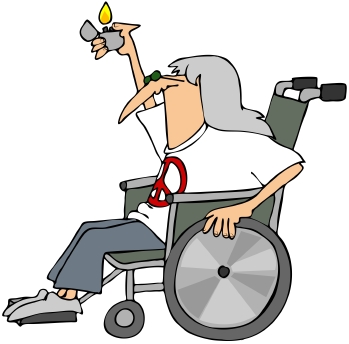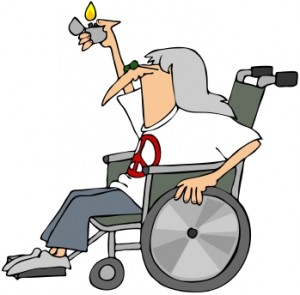Category: Customer service
Posted by Dr. El - November 26, 2012 - Customer service, Long-Term Living Magazine, Medication issues


Here’s my latest article on Long-Term Living magazine online:
Reducing antipsychotic medications? Try these behavioral interventions
With the recent focus on reducing antipsychotics in long-term care and substituting behavioral interventions, facilities may be left wondering what interventions to use and how to implement them. Here are ideas on how to prevent, investigate and monitor agitation on your units and address staffing needs to ease the transition from antipsychotic medication.
PREVENTION: BORROW FROM THE PSYCHIATRIC HOSPITAL
In a psychiatric hospital, the focus is on creating an emotionally healing environment—a therapeutic milieu. In long-term care, the focus is on providing high-quality physical healthcare and the frequently neglected therapeutic milieu can contribute to resident agitation. Take some time to walk your units and evaluate the emotional environment. This is what residents, and especially those with dementia, are reacting to and small changes can make a big difference.
Evaluate and adjust the physical environment. Is it disturbingly bright or so dark that older eyes can’t see who’s approaching? Is it very loud, with excessive overhead paging, chair alarms and shouting staff and residents? Is it too cold or too warm? Make environmental changes so that an older version of you wouldn’t mind spending time in the day room.
Provide appropriate programming. Are residents crammed together in a small area for long periods of time, creating the sensation of being trapped? Is the main activity a blaring television set? A therapeutic milieu is all about engaging the residents in appropriate activities with a pleasant flow through the day. Pursuits for residents with dementia can include music, baking, tactile and visual stimulation, etc. Providing activities off the unit offers additional stimulation to those who can tolerate it and lessens crowding in the day room. It can also offer a healthy diversion for cognitively intact residents.
Calm residents before they get agitated. The time for staff to act is when interactions between residents start to become tense, rather than waiting until an argument has broken out. Interventions such as distraction, redirection and a face-saving move to another location can be remarkably effective. Attending to individuals at early signs of distress can prevent episodes of full-blown agitation.
Use customer service techniques. Well-trained staff can often prevent agitation from occurring. Units can be transformed by charge nurses who speak to residents and staff alike in calm, respectful tones, address needs immediately and expect the aides working with them to do the same.
Staffing recommendations:
- Train all your staff in customer service techniques.
- Offer special workshops for nurses, aides and recreation therapists on providing care and activities for residents with dementia.
- Consider hiring nurses with psychiatric experience who understand how to maintain a therapeutic milieu.
INVESTIGATE: PUT ON YOUR SHERLOCK HOLMES HAT
If a resident is agitated despite environmental changes, look for underlying causes. Residents with dementia are often unable to speak through words, so they use other methods. Sometimes it takes a bit of sleuthing to figure out what they’re saying.
For more, visit LTL magazine online:
For more details on behavioral interventions, download Dr. El’s FREE report: Stop Agitating the Residents!
Posted by Dr. El - October 24, 2012 - Business Strategies, Common Nursing Home Problems and How Psychologists Can Solve Them, Customer service, Depression/Mental illness/Substance Abuse, Talks/Radio shows

Where was I last week and why didn’t I update my blog as usual? I was in Denver, speaking about Mental Health in Nursing Homes at the National Aging Services Risk Management conference sponsored by Caring Communities, Peace Church Risk Retention Group, and ECRI Institute. I addressed the fact that facilities are exposing themselves to multiple risks if they aren’t providing appropriate mental health care, and I offered practical, low- or no-cost ideas on how to improve mental health treatment in long-term care settings. The talk was recorded and will be available to ECRI Institute members at their website: ecri.org. In their words: ECRI Institute is an independent, nonprofit organization that researches the best approaches to improving the safety, quality, and cost-effectiveness of patient care.

Posted by Dr. El - October 2, 2012 - Business Strategies, Communication, Customer service, Long-Term Living Magazine, Resident care, Resident education/Support groups

 Here’s my latest article on Long-Term Living magazine online:
Here’s my latest article on Long-Term Living magazine online:
“Thanks, Doc, for telling me about this group!” Mr. Jones smiled and held up the magazine he’d gotten from the National Parkinson Foundation. “Except for that actor, I didn’t even know one person with Parkinson’s before I got my diagnosis—now I find out there are enough of them to have a whole Foundation!”“You feel better knowing you’re not alone,” the psychologist reflected.“Not only that,” he said, “but I’m learning a lot about Parkinson’s and how to handle it. I used to get so angry when I couldn’t do the things I used to do, but now I see it’s my illness. I’m gonna figure out how to deal with it,” he said with conviction.Like Mr. Jones, many residents enter long-term care with medical illnesses that are unfamiliar to them, sometimes years after their diagnoses. As discussed in the article 5 Reasons to Educate Residents About Their Illnesses, not only are properly educated residents more compliant with healthcare recommendations, but the coming baby boomers are going to demand information about their illnesses. Nursing homes that provide education for residents (and families) will be offering cutting-edge services that enhance the experience of their facilities and increase customer satisfaction.Here are seven simple methods to educate residents that are easy to implement and will help your facility stand apart from the crowd:
- Encourage discussion with medical staff upon admission and diagnosis. Part of the initial assessment of new residents should include asking them whether or not they know what their diagnoses are. Nurses and doctors can offer a brief explanation of unfamiliar terms and assess the need for more information, the length of time since diagnosis (the more recent the diagnosis, the more likely the resident will be in emotional distress and may benefit from mental health support), and the level of family involvement (involved family may need information too). Any new diagnoses after admission should be discussed with the physician and followed up as needed.
- Dispense fact sheets about illnesses. Every illness is Google-able. Chances are that your boomer residents and/or their family members will be researching their illnesses on their smartphones or laptops, but the details they’re obtaining may not be from reputable sources. By providing information from established medical sites, staff can direct residents to credible resources. The staff members also will have easy access to the information and can familiarize themselves with the illnesses and required care. Fact sheets could be in a binder available at the nursing stations for the staff to distribute or in a magazine rack accessible to the residents and visitors.
- Provide information about illness organizations and how they can join. Along with the basic details an illness fact sheet provides, residents can be offered information about disease-specific organizations. The mere knowledge of the existence of such groups can be helpful, since many residents feel alone with their illnesses, despite the fact that they may be sitting in the hallway next to another resident with the same disease. Privacy laws prevent staff members from sharing such similarities, and residents might not feel comfortable discussing their physical concerns with a neighbor on their floor. Illness-related societies can offer support, coping strategies, hope and perspectives that others are unable to provide. Joining such organizations can be an important step in regaining a sense of control over one’s life.
For more, visit LTL magazine online:
____________________
Now available on Amazon:
Everything You Wanted to Know About Your Nursing Home Stay
But Were Afraid to Ask
Posted by Dr. El - September 19, 2012 - Books/media of note, Customer service, Resident care
Maybe it’s because I live in the New York metropolitan area, but it seems every nursing home I’ve worked in is filled with residents and staff from all over the world. I find it an exciting environment with the opportunity to learn about different cultures at every turn. Somehow, despite our differences, we make it work and provide top-notch care for our residents. Unless they’re gay. Or lesbian, bisexual, or transgendered (LGBT). Then many LGBT residents, no matter what country they hail from, feel they need to go back into the closet and hide who they are from those caring for them. They fear the prejudice of staff members and rightly so, based on a number of conversations I’ve had with co-workers about the issue. According to The Aging and Health Report released by The National LGBT Health and Aging Center, 21% of LGBT seniors do not disclose their sexual or gender identity to their physician. Their physician.
If you’re looking for resources to address LGBT issues in LTC, consider showing your staff the award-winning hour-long documentary Gen Silent or using one of their training programs. I had the opportunity to view the film at the American Psychological Association conference last month and think it would make an excellent tool for addressing sexual diversity. Given the strong feelings many staff members have on homosexuality, a training program is likely to be more helpful than an open discussion of the issues. As a psychologist privy to the private concerns of residents, I can tell you that you do have LGBT residents within your facilities — you just might not know who they are.
Posted by Dr. El - August 21, 2012 - Business Strategies, Communication, Customer service, Long-Term Living Magazine, Medication issues, Resident care, Resident education/Support groups


Here’s my latest article in Long-Term Living Magazine online:
5 reasons to educate residents about their illnesses
“How long have you had Parkinson’s?” the psychologist asked Mr. Jones during his initial evaluation.
“They just told me the diagnosis when I got here last week, but I suppose I’ve had it for a while.” He said it casually, but his hands were clenched and his voice held a note of tension.
“Did the doctor explain what it is or give you information about the Parkinson’s Foundation?”
“No. All I know is that it’s the same disease that young actor has—what’s his name?”
“Michael J. Fox.”
“Yeah, that’s the one.”
The psychologist assured the resident she’d bring him a pamphlet from the Parkinson’s Foundation the following week. It would work better, she thought to herself, if the medical staff provided the physical health information so she could follow up with the mental health aspects.
Residents often enter long-term care with surprisingly little knowledge about their conditions, whether they have a recent diagnosis or have been living with an illness for many years. This lack of information isn’t good for residents, families or facility staff.
Here are five reasons why we should teach our residents about the illnesses they live with:
1. Education leads to more active resident involvement in care.
When residents have information about their illnesses, they are more able to accurately report their symptoms to the medical team and to provide the type of information that improves treatment. A resident without knowledge is a passive recipient of medication and care; a resident with knowledge can partner with his or her medical team to address needs and find effective solutions. Joan, for instance, had multiple sclerosis and was keenly aware that the hot summer made it difficult for her to walk in rehab. She was able to work with her therapist to find more manageable activities so that she could continue with her rehab program during the summer months. Contrast this with Leon, who blamed himself for his MS symptoms, believed his difficulty walking was a personal failure, and was referred for psychotherapy when he stopped attending rehab. With encouragement and some psychoeducation about his illness, Leon was literally able to get back on his feet again.
2. Knowledge increases compliance.
Uneducated individuals are less likely to comply with treatment recommendations or may reject medications due to side effects without fully considering potential benefits. Individuals who understand why particular medications are given and how to cope with potential side effects are more likely to comply with treatment. They’re also more likely to have reasonable, informed objections for foregoing a particular course of treatment—reasons that can be readily understood and documented. For example, Lucille was initially resistant to the dialysis treatments that were recommended for her. Once she gathered information and spoke to some other residents in the dialysis program, she ultimately decided that its life-saving benefits were worth the time and discomfort of the treatments. Thomas, on the other hand, decided against dialysis and was able to explain and document his end-of-life wishes clearly, based on his knowledge of his illness.
3. Information reduces anxiety.
Posted by Dr. El - July 5, 2012 - Business Strategies, Common Nursing Home Problems and How Psychologists Can Solve Them, Communication, Customer service, Engaging with families


Here’s my latest article in Long-Term Living magazine online:
Family members: 5 ways to turn fault finders into fans
For most families, entry into a nursing home is like being teleported onto a strange new planet. The arrival is often swift and unanticipated, and the customs are foreign and frequently unnerving. Think back to your first days in long-term care, subtract your training, add a sick loved one and consider from that vantage point what services you can offer to improve the experience of anxious family members. Here are five ideas to get you started:
1. Provide essential information up front.
Your admissions packet probably includes the basics already, such as a copy of the residents’ rights and information on how to finance a nursing home stay and how to file a grievance. Consider going beyond the essentials to provide helpful details such as the names of the nurses, aides, doctors and social workers, and the fact that, for example, nurses wear white and aides wear blue and what the difference is in their roles in the facility. Anticipate the need for other information such as the location of the business office or how the discharge process works.
2. Offer emotional support via family meetings.
Nursing home entry is an extremely stressful event in the life of a family. Family members may consider nursing home placement to be “the beginning of the end” and be experiencing anticipatory grief as they look toward losing their loved one, even though the loss might be many years away. Most families are negotiating the added life tasks of trying to decide what’s best for Mom and perhaps selling a home or dispersing a lifetime of possessions. Family disagreements are common. Nursing homes that offer supportive and informative sessions run by the social worker or psychologist, with community referrals as needed, are more likely to be viewed with gratitude for meeting this unspoken need than to become targets of misplace anxiety and rage. Examples of meeting topics could include “understanding dementia,” “supporting your loved one during nursing home placement” and “coping with changing family dynamics.” In addition, offering information on illnesses such diabetes, provided by a knowledgeable staff member or by a local representative of an organization such as the American Diabetes Association, can improve the compliance of families with residents’ special diets and reduce conflict with staff (and residents) around this issue.
3. Support the family council.
Posted by Dr. El - April 30, 2012 - Business Strategies, Customer service, McKnight's Long-Term Care News, Younger residents

Here’s my most recent article in McKnight’s Long-Term Care news online:

The “Single” Boom: Problems and Solutions for Long-Term Care
According to recent reports, one-third of the baby boomers who will be arriving at the doorstep of long-term care are unmarried. Many of them have no children. Just as our healthcare system relies on unpaid family caretakers, LTC relies on close family members who help our residents through their stays.
The demographic trends, however, suggest we need to prepare for increasing numbers of residents without close relatives.
Below are four ways we can expect this shift to impact our residents, and suggestions for how we can adapt to this change:
1. Lack of POAs, healthcare proxies or legal guardians
The Problem: Currently, most residents have someone available in their lives to make medical and legal decisions on their behalf. This trusted helper is able to collect the documents necessary to apply for Medicaid, for example, or to sell a home for the resident.
Typically, family members are informed of the need to sign or gather paperwork, and the nursing home awaits the documents. They generally arrive with or without further prompting, allowing for successful completion of the transactions.
In the absence of an involved family member, these essential activities are virtually impossible for a resident to accomplish independently from inside the nursing home, no matter how robust their condition. Residents, who often make a sudden trip from home to hospital to nursing home, generally don’t have important phone numbers, access to legal papers, Internet connectivity, or the wherewithal to make arrangements on their own, from afar, in the middle of a health crisis.
As we begin to see increasing numbers of elders in this situation, it will become apparent that what we are viewing is not an individual problem, but a systems problem.
The Solution: As a system, we’ll need more court-appointed powers of attorney, proxies and guardians available to our residents, as well as a greater emphasis on obtaining advance directives and community supports. Streamlining the process of obtaining these assistants will make life easier for everyone, and can be accomplished using some of the methods below:
• When assessing social supports upon admission, we can educate residents about the need for assistance in navigating their healthcare. It’s important to plant the seed early in admission because we can expect this idea to meet with resistance as residents struggle to maintain their independence. We can explain that obtaining helpers is not a reflection of a personal failing, but is unavoidable in a complicated healthcare system.
• We can offer increased independence via discussion of advance directives, which allow residents to make their own decisions regarding their healthcare.
• We can discuss with residents who among their family, church, and community members might be willing to assist them with their care and begin outreach toward potential helpers. Offering prepared pamphlets or other educational materials about what is involved in taking on a specific caregiving task will allay the concerns of those considering a helper role and reduce the burden on the social work staff communicating the information.
• Within our facilities, we can increase our connections to the local community. There we might find church volunteers, for example, who would be willing to take an active role in the lives of our residents, such as signing a back-up agreement for home healthcare or becoming a legal guardian.
• We can help residents create a personal caregiving team by connecting more distant relatives or friends who may be able to offer only limited assistance, but together meet the needs of the resident.
• We can increase the number and training of social workers in our centers, so they can take on the additional tasks required to address the above suggestions in a manner that enhances the reputation of the facility.
2. Lack of errand-runners
The Problem: A LTC facility often becomes the resident’s entire world, but not all of their needs can be met within the walls of the facility. A major and important function played by family members is that of procurer of outside items. Currently, residents rely on their family members to bring them home-cooked foods, clothing or items from the community, such as a favorite lotion or shampoo.
Residents without family or friends have come to rely on the kindness of strangers, like their roommate’s daughter, or the friendly aide who makes a grocery store run on her lunch break. This lack of control over formerly simple tasks leads to frustration and depression. Chores such as fixing a watchband become monumental in a nursing home. Using generic toothpaste instead of the brand enjoyed for 70 years can be a twice-daily reminder of lost independence.
Again, what appears to be an individual problem is actually a systems problem within each setting. An increase in the number of single residents will propel us to adjust the way we handle resident needs.
For more, visit McKnight’s Long-Term Care News online: The “Single” Boom: Problems and Solutions for Long-Term Care
Posted by Dr. El - December 22, 2011 - Boomers, Business Strategies, Customer service, Long-Term Living Magazine

Check out my article on the 10 anticipated psychosocial needs of baby boomers, now a web feature on Long-Term Living Magazine online.
10 anticipated psychosocial needs of baby boomers
Consider these changes as LTC adapts to the next generation
by Eleanor Feldman Barbera, PhD
We’ve heard the rumblings of the coming generation in the voices of our “young” residents in their 50s and 60s. It’s the younger residents who most often chafe at the restrictions of nursing home life, such as being unable to leave the facility unsupervised, or being cautioned to sit when they’d prefer to walk and take the risk of falling. As the baby boomers enter long-term care in greater numbers, those rumblings will grow louder, necessitating changes in how we deliver care. We’ll be more successful in making these changes if we anticipate the needs of the boomers, rather than merely reacting to their dissatisfaction.
Attending to their psychosocial needs will help your boomers find comfort, enjoyment and purpose in their later years, thereby creating vital, thriving organizations better able to adapt to changes in the long-term care landscape. Here’s what to look out for, and what you can do to help your organization and your residents.
1. Social connectedness
Internet access keeps boomer residents in touch with their social networks as well as the rest of the world. The next generation of residents will expect to be wired, so make your long-term care facility a hotspot now. To increase the value of this service, add adaptive equipment, along with training in how to use it, lockable laptop drawers, additional electrical outlets and policies on maintaining privacy in the nursing home.
2. Social differentiation
Say good-bye to “Goodnight, Irene” and hello to “You Can’t Always Get What You Want”, “Are You Lonesome Tonight?” and “Soldier Boy”. The universal music of earlier generations shifted toward more individualized preferences in our new cohort, so plan on mixing your Motown with your Hendrix nights. Our boomers also had exposure to a wide variety of ethnic foods during their lifetimes. Consider polling residents to discover their preferences and offering an international option on your menu for greater variety and the opportunity for personal growth.
To read more: 10 anticipated psychosocial needs of baby boomers.
Posted by Dr. El - October 21, 2011 - Customer service, Resident care


Check out my article in Long-Term Living Magazine this month: Resident Bathing Transformed: From Endurable to Enjoyable. Interestingly, the perspectives of the residents and staff members I interviewed about showers in the nursing home corresponded with research on providing good customer service. Click on the link, or paste this into your browser — http://tinyurl.com/5u757n2 — to read about the inexpensive and easy to implement suggestions for improvement.
Posted by Dr. El - October 5, 2011 - Customer service, Depression/Mental illness/Substance Abuse, Talks/Radio shows, Younger residents

 Will you be in Toronto on October 19th, 2011? Come hear Dr. El speak at the annual convention of the Activity Professionals of Ontario.
Will you be in Toronto on October 19th, 2011? Come hear Dr. El speak at the annual convention of the Activity Professionals of Ontario.
Participants will learn:
- How we react to working with younger residents, and how younger residents react to us as staff members.
- How to use this knowledge to create healthy resident/staff relationships, free of disruptive conflicts.
- What types of activities work best with this population.
- How to create a nursing home environment where younger people thrive.
Want Dr. El to speak at your next event? Call 718-218-DrEl (3537) or Click on the Contact Page






 Here’s my latest article on Long-Term Living magazine online:
Here’s my latest article on Long-Term Living magazine online:








 Will you be in Toronto on October 19th, 2011? Come hear Dr. El speak at the annual convention of the
Will you be in Toronto on October 19th, 2011? Come hear Dr. El speak at the annual convention of the